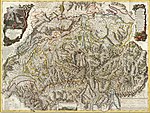| History of Switzerland |
|---|
 |
| Early history |
| Old Swiss Confederacy |
|
| Transitional period |
|
| Modern history |
|
| Timeline |
| Topical |
|
|
The territory of modern Switzerland was a part of the Roman Republic and Empire for a period of about six centuries, beginning with the step-by-step conquest of the area by Roman armies from the 2nd century BC and ending with the Fall of the Western Roman Empire in the 5th century AD.
The mostly Celtic tribes of the area were subjugated by successive Roman campaigns aimed at control of the strategic routes from Italy across the Alps to the Rhine and into Gaul, most importantly by Julius Caesar's defeat of the largest tribal group, the Helvetii, in the Gallic Wars in 58 BC. Under the Pax Romana, the area was smoothly integrated into the prospering Empire, and its population assimilated into the wider Gallo-Roman culture by the 2nd century AD, as the Romans enlisted the native aristocracy to engage in local government, built a network of roads connecting their newly established colonial cities and divided up the area among the Roman provinces.
Roman civilization began to retreat from Swiss territory when it became a border region again after the Crisis of the Third Century. Roman control weakened after 401 AD, but did not entirely disappear until the mid-5th century after which the area began to be occupied by Germanic peoples.